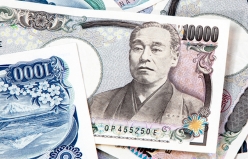Trading the Japanese Yen

| Broker | Bonus | More |
|---|
Historical Facts About the Yen
The Japanese Yen is Japan’s official currency, and is the third most-traded Forex currency following the US Dollar and the Euro. It is also a popular reserve currency, coming in just behind the USD, the Euro and the GBP. The Meiji government first created the idea of the Yen as a unified currency modelled on Europe’s decimal system. In 1871, the New Currency Act was drawn up, which established the Yen as Japan’s new decimal currency, with the Bank of Japan being created in 1882 to control the supply of money.
After the end of the Second World War, the Yen lost a lot of its value and in order to bring stability to the economy, the Yen’s exchange rate was pegged to the US Dollar. In 1971, this system was abandoned and the Yen was allowed to float freely on the market. There then followed periods of both depreciation and appreciation because of the oil crisis in 1973, which led to the government maintaining a currency intervention policy. This means that the Yen has a “dirty float regime” which continues to this day. There is a strong focus on encouraging a competitive market for exports by ensuring that the Yen has a low value through having a trade surplus. Although there was a temporary change in this situation in 1985 due to the Plaza Accord, since then the Yen has once more decreased in value, with the BOJ maintaining a policy of extreme anti-inflation, with interest rates being kept close to zero .
The Japanese Economy and the Yen
There are several specific attributes that particularly appertain to the Japanese economy which must be understood by anyone who wishes to Forex-trade with the Yen. Firstly, since Japan’s real estate bubble collapsed, its economy has seen very little growth, rarely exceeding 2% in the last decade or so. For the last 10 years, the country has actually been experiencing deflation, with negative or zero rates on multiple occasions. Secondly, the Japanese population is the oldest major one worldwide, with an especially low fertility rate. The workforce is ageing, and there are now fewer young workers to boost the economy through consumption and taxation. As Japan has very few immigrants, the demographics are difficult to balance. Thirdly, Japan’s workforce is well educated, and the nation’s economy is very advanced. While some industries such as shipbuilding have relocated to China and South Korea, Japan itself still leads the way in manufacturing, with industries such as automotives, consumer electronics and technological components featuring strongly, leaving Japan with a strong exposure to global economies, yet depending increasingly on trade with China.
Which Factors Have an Influence on the Value of the Yen?
Several factors come into play when determining the value of the Japanese Yen, and the Tankan Survey is an especially good indicator. This quarterly report is published by the Bank of Japan, and is often responsible for moving trade in Japanese currency and stock. Another important indicator to look at for the Yen is trade flow data. The Yen is especially popular with traders who prefer to use a carry trading strategy. Thanks to the Bank of Japan’s policy of keeping interest rates close to zero, Japan is a major source of capital for carry trades. However, any discussion of raising the Japanese Yen’s interest rate will cause disturbances across the currency market. Although interest rates have remained low for some time, the Bank of Japan has been heavily involved in currency interventions in order to keep the export industry as competitive as possible. As this has had political consequences historically, today the BOJ is fairly hesitant to involve itself in the Forex market. The trade balance in Japan also has an impact on the Bank of Japan’s policies and Forex rates. There are large trade surpluses in Japan; however, the country also has an ageing population coupled with large public debt. Luckily, much of that debt is domestically held, with Japanese investors accepting a low rate of return. The Yen is Asia’s signature currency, being one of the most- traded world currencies, and acting as one of the primary reserve currencies in Asian countries. Should the Chinese Yuan become more liquid in the future, the Japanese Yen could be at some risk, although this process is likely to take some time. The Yen still has a “safe haven” status, and this has only led to making the Yen even stronger and more appealing to investors.


